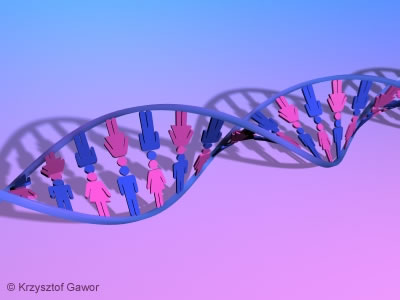Schizophrenia and bipolar disorder affect tens of millions of individuals around the world. These disorders have a typical onset in the early twenties and in most cases have a chronic or recurring course. Neither disorder has an objective biological marker than can be used to make diagnoses or to guide treatment. Findings in Biological Psychiatry, published by Elsevier suggest that electroretinography (ERG), a specialized measure of retinal function might be a useful biomarker of risk for these disorders, and retinal deficits may contribute to the perceptual problems associated with schizophrenia and bipolar disorder. [continue reading…]
Bipolar Disorder
Researchers have new evidence that a simple eye test could help diagnose inherited mental health conditions such as bipolar disorder (manic depression).
Monash University neuroscientist Dr Steven Miller led a national team of researchers to test the binocular rivalry rates of 348 sets of twins — 128 of which were identical.
The test measured the twins’ binocular rivalry — the ‘switching’ of their visual perception from one image to the next, when two dissimilar images were simultaneously presented, one to each eye.
Dr Miller’s study of twins showed that switching rates were very similar between each set of identical twins, yet were substantially less so for non-identical twins, suggesting a genetic contribution to an individual’s switching rate.
“By studying such a large group of identical and non-identical twins we can determine the likelihood of genetics being responsible for certain biological traits,” Dr Miller said.
Dr Miller said testing of binocular rivalry was important because it could be an indication of a person’s mental health, based on his previous study of switching rates in patients with bipolar disorder. [continue reading…]
 Researchers at the Queensland Institute of Medical Research (QIMR), in collaboration with scientists from the University of Edinburgh, have found a new gene that is linked to schizophrenia and bipolar disorder.
Researchers at the Queensland Institute of Medical Research (QIMR), in collaboration with scientists from the University of Edinburgh, have found a new gene that is linked to schizophrenia and bipolar disorder.
The gene, called ABCA13, is active in the hippocampus and cortex regions of the brain and had not previously been associated with mental illness. [continue reading…]

Image: iStockphoto
“The new structure and new stresses for [bipolar] students who leave home to go to school sometimes can trigger problems and relapses,” says Richard Kadison, MD, the chief of mental health services at Harvard University and the author of College of the Overwhelmed: The Campus Mental Health Crisis and What to Do About It. These stresses, he adds, can also trigger mania in students who have an underlying vulnerability to bipolar disorder. “Oftentimes, the first manic episode occurs in college,” Dr. Kadison says. link to read complete article
Source: Health.com

